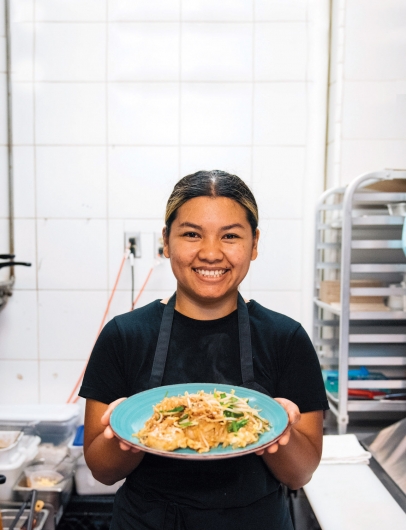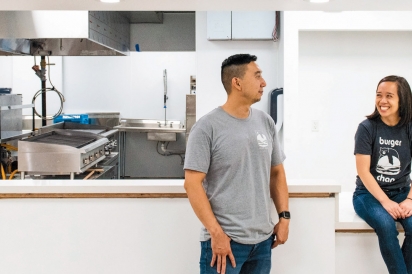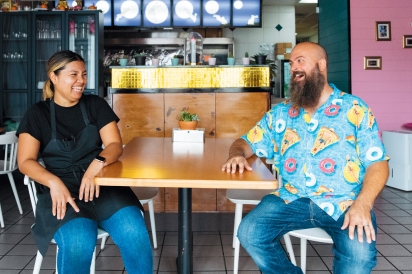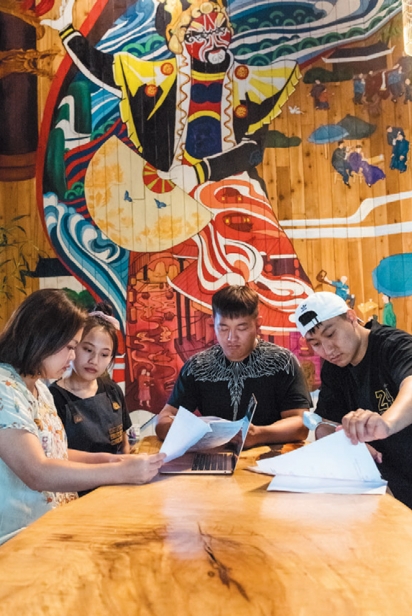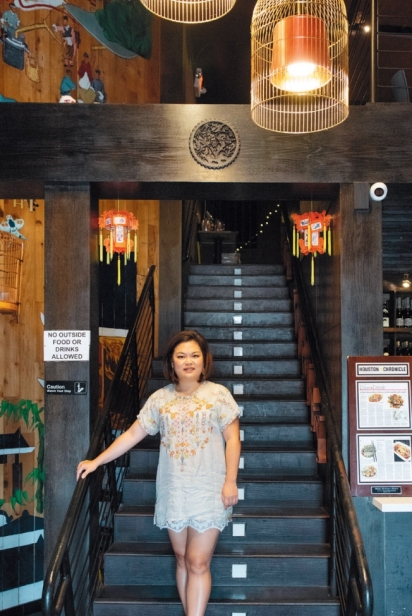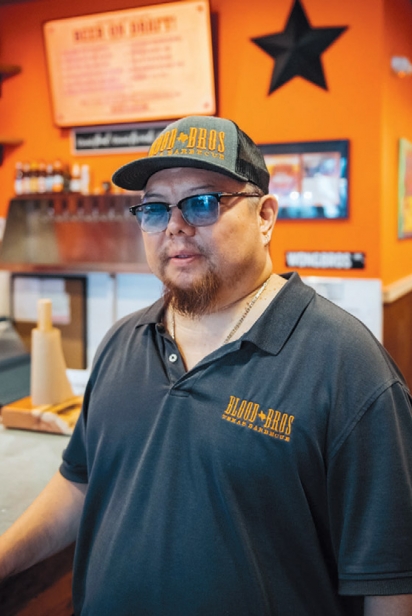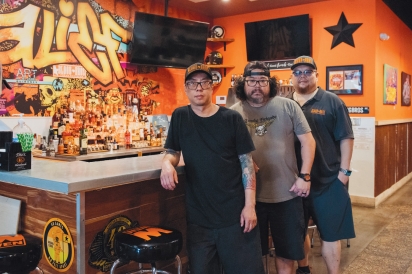Houston's Asian Community Pulls Together
Strong and diverse community helps to navigate tough times
The location of “burger-chan 2.0,” as co-owners Diane and Willet Feng like to call the restaurant they plan to open in fall 2021, is a place of promise: bright white walls waiting to be painted by local artists; boxes of Ikea tables ready to be assembled; gleaming- new flat top, grill, range and fryers positioned in the kitchen waiting to be connected to gas lines.
The unfinished space is much like the Houston food scene: a complex, constantly changing work in progress that relies on many communities interacting to create a working whole. Yet to come are the people who will make the space a restaurant: customers, friends and families, staff, and other chefs and restaurateurs.
It has been these communities interacting with each other that has helped many Houston-area restaurateurs and staff survive during the pandemic.
To say the past months have been difficult for the Houston restaurants is an understatement. Staff and owners have had to navigate an ever-shifting landscape of declining sales, unemployment, forced dining- room closures, often-changing rules and regulations, increased supply costs, COVID testing, the surging Delta variant and much more.
For many restaurants in Houston’s Chinatown—the business corridor that runs along Bellaire Boulevard east and west of Beltway 8—the difficulties began earlier. In late January 2020, false rumors about coronavirus in the district began to swirl weeks before official lockdowns. Terry Wong, who co-owns Blood Bros. BBQ with his brother Robin and childhood friend Quy Hoang, recalls, “Right at the beginning, when that rumor first started about the grocery store, it literally shut down Chinatown that week.”
According to Cori Xiong, founder and owner of Mala Sichuan Bistro, which has four locations in the Houston area, those rumors were “the biggest thing affecting our business, especially the Chinatown location, before the shutdown.”
Terry, who grew up in Alief and has long frequented the restaurants in Chinatown, wanted to do something to help these struggling businesses. He initially thought of doing a print guide to Chinatown restaurants but decided that it was too expensive and that information was changing too rapidly. So he toyed with an online guide, before eventually deciding on a Facebook group called Chow Down in Chinatown, because it was more flexible and community oriented. The initial goal of the group, which has over 17,000 members, was to promote the many restaurants on this diverse and vibrant strip.
Terry and a team of friends have volunteered countless hours moderating thousands of posts about dining in Chinatown and elsewhere in the city. Posts range from people documenting meals at favorite eateries to requests for recommendations on where to get everything from Hong Kong—style shrimp wonton noodles to all-day dim sum. These latter posts are some of Terry’s favorites because “these will be flooded with suggestions.” He says the efforts have been appreciated and helpful and that business in Chinatown is improving. At one point, as Terry puts it, “These places were hanging on by a limb.” Cori concurs. For her, “business slowly came back after April [2021] or so.”
The road to recovery has been difficult for many restaurateurs. In August 2020, the Fengs decided to close their well-regarded original burger-chan location in the food court at Greenway Plaza. Before the pandemic, The Hub, as the Greenway food court is officially known, had a large built-in clientele: office workers from the 11 buildings that make up complex. But as COVID-19 shuttered offices, business at burger- chan shrank. Diane Feng says, “Beginning of August, we knew we needed to close because the numbers weren’t there. Occupancy wasn’t there and vaccines were talked about but that wasn’t there. So we wanted to end it before it got worse.”
Though closing a business is never easy, several factors helped the Fengs through the closing and the following months of COVID chaos. One of those was their upcoming restaurant in the Galleria area, originally envisioned as a second location. They signed on it prior to the pandemic. Now, with the Greenway spot closed, they could focus on burger-chan 2.0. “It will probably be more stressful [than the first location],” says Willet Feng, “but what makes it seem worthwhile is all the excitement we see from old customers and potential new customers. Seeing their excitement really makes if feel like something worth doing, something worth sacrificing for.”
But their community of customers is providing more than just moral support. Some are providing financial support. After exploring more traditional loan options for funding the new location, the couple decided to create a Kickstarter-style program of tiered investments with exclusive benefits. “We put feelers out there to friends and family and customers,” says Willet. “The response was overwhelming. We got so many people who offered to invest.”
Family has also played a key role in helping the Fengs through the pandemic, as it has for other Asian purveyors they have talked to. Diane says, “When we closed technically, we were eligible for unemployment. But we didn’t apply for it because our parents worked good jobs for 30—40 years. They had pensions, savings, and when we closed, they said, ‘We got you.’ They basically gave us an allowance. That generation came here from Taiwan, Hong Kong, etc. in the ‘70s and the ‘80s with advance degrees … my mom was a pharmacist. They were doing these jobs for stability, financial stability, so we could have opportunity and have a safety net.”
While the Fengs closed a restaurant during the pandemic, Benchawan Jabthong Painter and her husband, Graham, opened one: Street to Kitchen, a Thai restaurant in Houston’s East End. The Painters moved from Thailand to Houston several years ago and Benchawan— who began cooking in her grandmother’s restaurant in Nakhon Sawan, Thailand, when she was 6— dreamed of opening a tasting-menu restaurant that used local and indigenous ingredients to create a Thai cuisine authentic to the Texas Gulf Coast.
But the pandemic had other plans. As COVID-19 spread through Houston, Graham says, “All of Benchawan’s pop-ups and finer-dining gigs got canceled and my ad agency business dried up.”
The couple had to pivot quickly. They found an affordable brick-and-mortar location in an unassuming strip center less than a mile from their East End home and, in July 2020, they opened Street to Kitchen—a concept they had already been operating as a popup and at Urban Harvest’s Saturday farmers market. Instead of offering a fine dining tasting menu, they focused on serving authentic Thai comfort and street food, a menu more suited to the pandemic and to takeout.
Despite opening in the middle of one the most challenging economies in decades, it took off like “gangbusters,” Graham says, noting that, “Of course, ‘gangbusters’ is a relative term. It was enough to pay the bills and not really much else. But it did get us through.” He adds that now, with in-house dining, they “have grown leaps and bounds.”
He says they attribute their success to “three distinct communities: the East End, the farmers market crowd and the restaurateurs and chefs.”
The couple fell in love with the East End as soon as they moved there from Sugar Land. While walking their dog the night they moved in, three different neighbors invited them for a beer. The neighborhood’s urban vibe and diversity reminded them of Bangkok. “It brings back memories of being in Thailand,” says Benchawan. “When you walk, people always say hi to you. They ask, ‘How are you?’ It’s nice to talk to your neighbors.”
Wanting to respect their welcoming neighborhood, which is one of the oldest Mexican American communities in Houston, they wanted to avoid the pitfalls of gentrification. So when they opened the restaurant they sought the support of the East End Chamber of Commerce, and their initial signage was only in Spanish. The approach was successful and many of the customers in the neighborhood were happy have a new cuisine to try.
“They came in and showed a lot of support,” says Graham. “We thought that’s what we would rely on, the local neighborhood. But we were surprised by two other communities. One was our Urban Harvest crowd. They weren’t only supporting our booth at the farmers market, they were coming to the restaurant and really putting in the orders. Tipping really well, showing lots of support. … And then we had the restaurateurs and the chefs. They, still to this day, are a huge part of our business.”
For the Fengs, the support of industry folks was also key. Says Diane, “Among restaurant people there is this unspoken understanding of just how bad the situation was. That was nice. That sense of community.” Inspired by Feed the Frontline initiatives, the Fengs launched Food Is Love, an ad hoc program to give back to fellow restaurant staff and owners by buying lunch at one restaurant and delivering to staff at another.
Feed the Frontline efforts provided more than just inspiration for Cori—who is from Chengdu, in China’s Sichuan province, and spent her teen years in the Dallas area, where her father owned a restaurant. The program provided financial support. During the height of the pandemic, both the Asian Chamber of Commerce and the U.S.—China Restaurant Alliance purchased meals from Mala Sichuan to give to healthcare workers and first responders.
In wasn’t just organizations that helped; Mala Sichuan’s Chinese costumers also rallied to support. “Chinese customers living in different geographic locations helped out too,” Cori says. “For example, Chinese customers living in Katy, Woodlands, Memorial, the Medical Center and Sugar Land would place group orders and we would deliver those orders in one trip.”
The pandemic is, unfortunately, still with us and the future for many restaurants is still uncertain. But the many communities supporting them are helping them navigate a path to recovery.
As Cori says, “I think Asian-owned restaurant will only grow faster. There’s still so many great products that Asian cuisines have to offer that are not widespread yet.” And, she adds, “I guess people can’t really cook all of their meals at home.”


